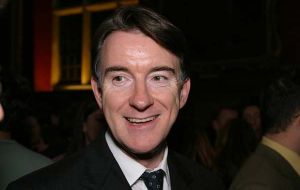MercoPress. South Atlantic News Agency
New attempt, this time in India, to end Doha Round deadlock
 EU Trade Commissioner Peter Mandelson
EU Trade Commissioner Peter Mandelson Four leading trade powers will meet Wednesday in New Delhi, India for two days of potentially make-or-break talks to end a deadlock in the Doha Round of global trade negotiations.
Ministerial representatives from the G4 group of influential trading players, European Union, United States, Brazil and India, will strive to reach a common position on agriculture, industrial goods and services in the framework of the World Trade Organization negotiations. Japan and Australia are scheduled to join the group in a second stage of talks. "These talks are timely and important," EU Trade Commissioner Peter Mandelson said in Brussels ahead of the talks. "If we fail (at these talks), Doha's prospects for this year will be lost." The meeting will be attended by Mandelson, Indian Commerce Minister Kamal Nath, US trade representative Susan Schwab and Brazilian foreign minister Celso Amorim. "We hope there'll be some movement (at this meeting) but it depends on how far developing countries' aspirations are fulfilled" an Indian government spokesperson said in New Delhi. WTO is hoping to reach a deal before the end of June when crucial trade negotiating powers granted to the US President George Bush by Congress (Trade Promotion Authority) are set to expire. If a breakthrough can be achieved by June, a conclusion to the Doha talks â€" which have been called a once-in-a-generation chance to help bring millions out of poverty â€" could be reached in about eight months, WTO officials say. Otherwise the Doha round, launched in Doha in 2001 risks years of delay, they said. An agreement among the world's two biggest trading powers, the US and EU, and two leading developing nations India and Brazil, is seen as crucial to hopes of brokering a compromise among the WTO's 150 members this year. India and Brazil have emerged as leaders in the developing world's challenge to the wealthy nations to curtail generous farm subsidies as they seek to keep their own agriculture supports. The official Indian position has been that New Delhi prefers "no deal to a bad deal", particularly if there's no advance in farming subsidies. The EU and other WTO members have called for Washington to make a new, more radical proposal on cutting farm subsidies while the EU is being pushed for steeper reductions in farm product tariffs. "We want real, effective reductions in huge farm subsidies by countries like the US which distort world agriculture prices" said the Indian spokesperson adding that "we must have a level playing field so the round's development mandate is fulfilled". Developing nations are being pressed to open their markets wider to industrial goods and services and the US is seeking fewer farm products on their "protected" list. But India and other developing nations argue they need their farm tariffs to protect the livelihoods of their huge farming populations. Up to 80% of the workforces in developing nations depend on agriculture. Mandelson said India, Brazil, the EU and the US need to put solid offers on the table if negotiations are to succeed. "It's the responsibility of the G4 to put the numbers on the table" on reductions in farm support and agriculture and industrial tariffs, he said




Top Comments
Disclaimer & comment rulesCommenting for this story is now closed.
If you have a Facebook account, become a fan and comment on our Facebook Page!